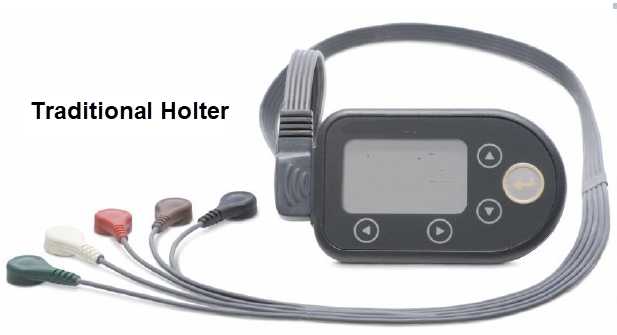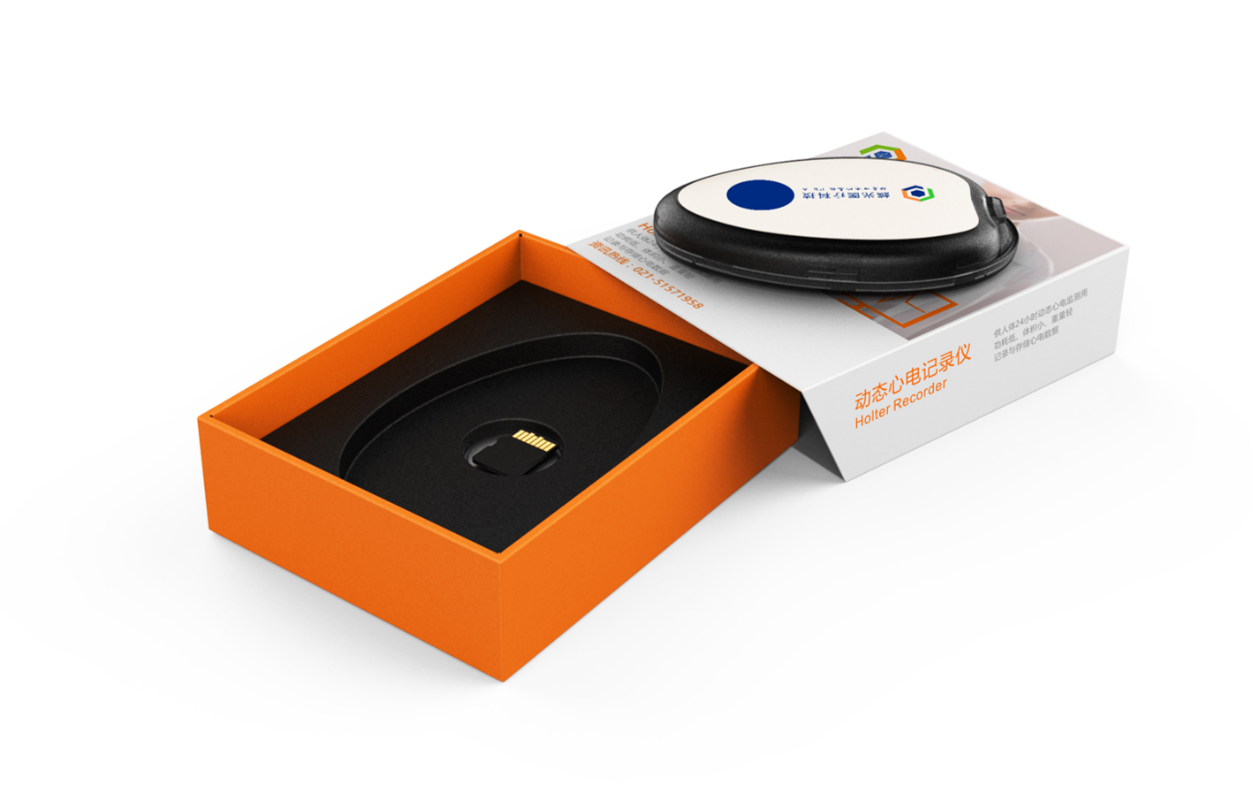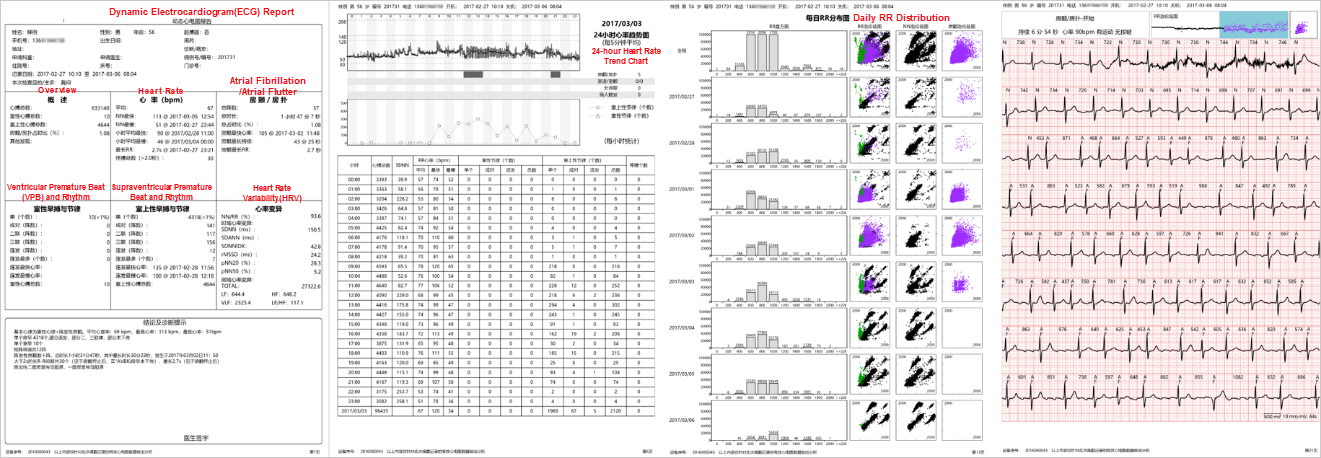Technology has become the "new infrastructure" for various industries, including the medical industry.
Under the development of new technologies, some secret and dangerous diseases will have no place to hide. Dynamic Electrocardiogram (ECG) monitoring and long-range dynamic ECG monitoring can screen and identify asymptomatic or occult arrhythmia patients. Such technologies can help clinicians discover and identify arrhythmia earlier and take the appropriate treatment measures.
Clinical diagnosis requires a specific duration of the patient's dynamic ECG monitoring; the diagnostic output rate rises based on how long the monitoring time is. The chance of discovering the abnormality is greater with more information. This is more conducive to diagnosis.
Due to power consumption, the traditional Holter ECG monitoring equipment can only work continuously for a maximum of 24 hours or seven days. The monitoring duration is limited. In addition, a large number of electrode plates are pasted on the patient's body, which is very inconvenient for patients.

PrudenceMed is a mobile medical device developer, mainly providing intelligent medical devices, on-cloud medical-level processing systems for medical information, and mobile management and interaction software. The long-range dynamic ECG recorder provided by PrudenceMed is small, light, and easy to use. Patients only need to use two finger-sized pieces of equipment on their left chest, and it does not affect their daily life. Dynamic ECG can be recorded continuously for up to 30 days.

The total number of a person's heartbeats exceeds 100,000 per day and over 3 million for 30 consecutive days. It is too time-consuming for doctors to find abnormalities with naked eyes and a large amount of data. AI-assisted diagnosis can save a lot of time.
PrudenceMed uses a long-range dynamic ECG recorder to record data. The equipment is returned to the hospital after the inspection. Then, the data is uploaded through special software, and the AI algorithm is used to analyze the data on the cloud. It assists the doctor to check and audit the holographic data and issue a diagnosis report.
However, patients come to see a doctor mainly in the morning before work (especially on Mondays), so there is a peak flow. In the early days, PrudenceMed used a specific amount of predetermined resources to process the uploading and analysis tasks. Tasks had to queue up during peak hours, and the company had to buy new instances for manual scale-out.
When founded in 2014, PrudenceMed chose Alibaba Cloud to provide technical support. PrudenceMed chose Alibaba Cloud container services because of worldwide container trends. The cloud-native architecture based on container technology fits perfectly with the elastic traffic demand of PrudenceMed. Since Alibaba Cloud launched the Elastic Container Instance (ECI) in 2019, PrudenceMed has become a seed user.
ECI is a Serverless and O&M-free container infrastructure that is integrated seamlessly with Alibaba Cloud Serverless Kubernetes (ASK) container services. They provide customers with Serverless containers featuring high elasticity, low-cost, and zero O&M. Thus, the O&M and capacity planning of container clusters are saved.
PrudenceMed can initiate multiple data transmission tasks to process surging requests in a short period using Alibaba Cloud ASK and ECI. After tasks are processed, resources can be released quickly. This avoids resource waste, and 50% of costs are saved.
ECG data analysis requires very high accuracy. Even if the accuracy rate of ECG data analysis is 99%, there will be 30,000 errors that need to be corrected by doctors. There is also a delicate balance between the accuracy and sensitivity of the machine.

PrudenceMed has been constantly improving its models. However, training an AI model requires a lot of GPU computing capabilities, and the GPU is very expensive if purchased alone. Under such circumstances, the large-scale GPU computing capability on the cloud came right on time. PrudenceMed also reduces training costs by using Alibaba Cloud GPU Spot instances.
The Alibaba Cloud GPU Spot instance (Spot instance for short) dynamically adjusts its price according to the hourly demand. The minimum price can reach 10% of the price in pay-as-you-go mode. It is suitable for short-term (less than one hour) AI analysis and training tasks.
The accuracy rate (based on internal statistical data) of ECG data analysis of PrudenceMed can reach 99.95% with AI assistance. Many training experiments were conducted using the cloud GPU computing capability, and the analysis model was optimized substantially. As a result, errors were reduced by 80%, and the accuracy rate increased to 99.99%.
"Each time we run the container, it takes only a few minutes for uploading and inference. Previously, it might take ten minutes to start a machine and then deploy a container, and shutting it down also needed time. With ECI, computing resources get ready faster, and the queuing time is shortened by 10-20%. In the past, the CPU was used to process data to save costs. Later, we used GPU because it was supported by ECI. This shortens the overall data processing time by 90%. Also, the Serverless container is more convenient for O&M, which saves the management of the underlying ECS assets. Originally, the operating system and system images needed to be managed, but now we only need to focus on the Docker images of business applications." – Xing Wenhui, CTO of PrudenceMed
"Our technology assists the analysis. The higher the accuracy rate, the less time the doctor needs for correction. Thus, the supply-side capability of medical services can be improved. The development of AI and cloud computing technology will bring greater convenience and value to the medical industry." – Pu Yachuan, CEO of PrudenceMed
ECI provides secure Serverless container services. It allows users to run containers without managing underlying servers. Users only need to provide packaged Docker images to start the container. Moreover, users only pay for the resources that have been consumed by the containers. For more information about ECI, please see the product page and "Get Started With ECI."
The Serverless container service is a secure and reliable container service based on the Alibaba Cloud elastic computing architecture. It is fully compatible with the Kubernetes ecosystem. Users can create Kubernetes container applications easily without managing or maintaining clusters with ASK. Users are charged based on used CPUs and memory resources in pay-as-you-go mode. This allows users to focus more on the application rather than the infrastructure that runs the application. For more information about ASK, please visit https://www.alibabacloud.com/help/doc-detail/86377.htm
Elastic GPU Service is a GPU-based computing service ideal for scenarios, such as deep learning, video processing, scientific computing, and visualization. For more information about Elastic GPU Service, please see the product page.
A Brief Introduction to AI Cloud-Native: TAL's AI Platform Practice
Experiences and Lessons from the Management Practices of Alibaba Kubernetes

228 posts | 33 followers
FollowAlibaba Clouder - April 26, 2021
Alibaba Cloud Serverless - November 27, 2023
Alibaba Clouder - January 18, 2019
Alibaba Cloud Storage - June 19, 2019
Alibaba Cloud Native Community - December 6, 2022
Alibaba Cloud Native - August 6, 2024

228 posts | 33 followers
Follow GPU(Elastic GPU Service)
GPU(Elastic GPU Service)
Powerful parallel computing capabilities based on GPU technology.
Learn More Offline Visual Intelligence Software Packages
Offline Visual Intelligence Software Packages
Offline SDKs for visual production, such as image segmentation, video segmentation, and character recognition, based on deep learning technologies developed by Alibaba Cloud.
Learn More ACK One
ACK One
Provides a control plane to allow users to manage Kubernetes clusters that run based on different infrastructure resources
Learn More Container Registry
Container Registry
A secure image hosting platform providing containerized image lifecycle management
Learn MoreMore Posts by Alibaba Container Service